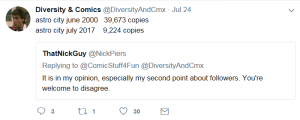My morning commute has slowly evolved into the Diversity and Comics Roadshow. For those not in the know, the nameless creator of this YouTube series talks comics. Usually, he reviews a single issue of a comic book, but he also produces episodes on various subjects, many of which revolve around Marvel’s self-inflicted gunshot wounds. Not only does he provide interesting historical background information, he spots trends, and calls out the good and bad of every issue. From his analysis of the artwork itself, it’s obvious the man knows what he is talking about. He is also a funny host with a dry wit and often a barely restrained rage that entertains even as it informs.
Most of the information that he provides in his autopsies of what doesn’t work does me no good. The constant litany of SJW and barely past their teens writing mistakes are not the sorts of things that I need to guard against. But it’s darn fun to be able to vicariously experience the dreadful writing and erratic plotting and clumsy left-wing preaching through D&C. The guy tries to bridge a middle ground, but the egregious own-goals of Marvel are clearly pushing him hard into the welcoming arms of the alt-right. His SJW takedowns and thorough and professional and hilarious.
The field of comics serves as a useful case study in the cancerous effects of SJW culture in general and feminism in specific. Comic books themselves did about $1 billion in sales in 2016, compared to a global film market of $38 billion and video games market of $91 billion. As a content creator in the literary world (the biggest of the four mediums at $127 billion), this serves as a powerful incentive to rein in any impulses you might have to sip from the SJW kool-aid.
With a smaller environment, we can more easily see the market effects of a little thing like erasing the biggest names in the industry (Hulk, Iron Man, Thor, Spidey, etc.) and brown-washing them with brand new demographic placeholders. Spoiler alert! It’s not pretty on either the creative or the financial side.
Or take this classic example of what happens to the sales of a comic book as it’s main writer and intellectual shepherd continues to drink from the SJW kool-aid spigot:



His channel is excellent.
And relatively young. He's got several thousand subscribers after just 4 months, I think? He's going to have more views on the regular than Marvel sells comics by the end of the year.